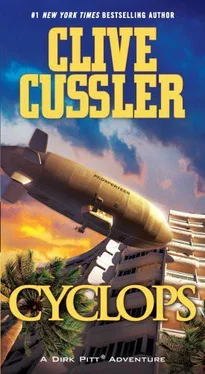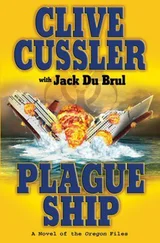Castro still remained a Marxist revolutionary at heart, but he was mellowing. After agreeing in principle to the U.S.-Cuban friendship pact, he unhesitantly accepted an invitation to visit with the President at the White House and make an address before Congress, although he did grumble when asked to keep his speech to twenty minutes.
At dawn on the third day after the explosions an old peeling, weather-worn vessel dropped anchor almost in the exact center of the harbor. Fireboats and salvage craft swept past her as though she were a disabled car in the center of a highway. She was a squat workboat, broad and beamy, about sixty feet in length with a small derrick on the stern whose boom extended over the water. Her crew seemed oblivious to the frenzy of activity going on around them.
Most of the flames in the dock area had been extinguished, but firemen were still pouring thousands of gallons of water on the smoldering debris inside the heat-twisted framework of the warehouses. Several blackened oil storage tanks across the harbor sputtered with stubborn flame, and the acrid pall of smoke reeked of burned oil and rubber.
Pitt stood on the bleached deck of the workboat and squinted through the smoky yellow haze at the wreck of the oil tanker. All that remained of the Ozero Baykai was the scorched superstructure on the stern that rose grotesque and distorted above the oily water. He turned his attention to a small compass he held in one hand.
"Is this the spot?" asked Admiral. Sandecker.
"Cross bearings on the landmarks check out," Pitt answered.
Giordino stuck his head out the wheelhouse window. "The magnetometer is going crazy. We're right over a heavy mass of iron."
Jessie was sitting on a hatch. She wore gray shorts and a pale blue blouse and looked like her old luscious self.
She flashed a curious look at Pitt. "You still haven't told me why you think Raymond hid the La Dorada on the bottom of the harbor and how you know exactly where to look."
"I was stupid not catch on immediately," explained Pitt. "The words sound the same, and I misinterpreted them. I thought his last words were `Look on the m-a-i-n s-i-g-h-t.' What he was really trying to say was `Look on the M-a-i-n-a s-i-t-e."
Jessie looked confused. "Maine site?"
"Remember Pearl Harbor, the Alamo, and the Maine. On or about this spot in 1898 the battleship Maine blew up and launched the Spanish-American War."
An edge of excitement began to form inside her. "Raymond threw the statue on top of an old shipwreck?"
"Shipwreck site," Pitt corrected her. "The hulk of the Maine was raised and towed out to sea, where she was sunk with flag flying in 1912."
"But why would Raymond deliberately throw the treasure away?"
"It all goes back to when he and his marine salvage partner, Hans Kronberg, discovered the Cyclops and salvaged the La Dorada. It should have been a triumph for two friends who fought the odds together and stole the most sought-after treasure in history from a possessive sea. And it should have had a happy ending. But the tale turned sour. Raymond LeBaron was in love with Kronberg's wife."
Jessie's face tensed in understanding. "Hilda."
"Yes. Hilda. He had two motives for wanting to get rid of Hans. The treasure and a woman. Somehow he must have talked Hans into making another dive after the La Dorada was raised. Then he cut the lifeline, leaving his friend to die a horrible death. Can you imagine what it must have been like, strangling in agony deep inside a steel crypt like the Cyclops?"
Jessie averted her eyes. "I can't bring myself to believe you."
"You saw Kronberg's body with your own eyes. Hilda was the real key. She outlined most of the sordid story. I only had to fill in a few details."
"Raymond could never commit murder."
"He could and he did. With Hans out of the picture he went one step further. He dodged the Internal Revenue Service-- who can blame him when you remember the federal government collected over eighty percent of income above $150,000 in the late fifties and sidestepped a time-consuming lawsuit from Brazil, which would have rightly claimed the statue as a stolen national treasure. He kept quiet and set a course for Cuba. A shifty man, your lover.
"The problem he now faced was how to dispose of it. Who could afford to pay even a fraction of twenty to fifty million dollars for an art object? He was also afraid that once the word was out the current Cuban dictator, Fulgencio Batista, a racketeer of the first magnitude, would have it seized. And if Batista didn't grab it for himself, the army of Mafia hoods he invited into Cuba after the Second World War would. So Raymond decided to carve up the La Dorada and sell it bit by bit.
"Unfortunately for him, his timing was bad. He sailed his salvage boat into Havana on the same day that Castro and his rebels swarmed into town after toppling Batista's corrupt government. The revolutionary forces immediately closed down the harbors and airports to stop Batista's cronies from fleeing the country with uncountable wealth."
"LeBaron got nothing?" asked Sandecker. "He lost it all?"
"Not entirely. He realized he was trapped and it was only a question of time before the revolutionaries searched his salvage boat and found the La Dorada. His only option was to hack out whatever he could carry and catch the next plane back to the States. Under cover of night he must have slipped his salvage boat into the harbor, hoisted the statue overboard, and dumped it on top of the site where the battleship Maine had blown up seventy years before. Naturally he planned to come back and retrieve it after the chaos died down, but Castro didn't play according to LeBaron's rules. Cuba's honeymoon with the United States soon fell apart and he could never return and raise three tons of priceless treasure under the eyes of Castro's security."
"What piece of the statue did he remove?" Jessie asked.
"According to Hilda, he pried out the ruby heart. Then, after he smuggled it home, he discreetly had it cut, faceted, and sold through brokers. Now he had enough leverage to reach the pinnacle of high finance with Hilda at his side. Raymond LeBaron had arrived in fat city."
For a long moment they were quiet, each with his own thoughts, envisioning a desperate LeBaron throwing the golden woman over the side of his boat thirty years ago.
"The La Dorada," said Sandecker, breaking the silence. "Her weight would have pushed her deep beneath the soft silt of the harbor bottom."
"The admiral has a point," said Giordino. "LeBaron failed to consider that finding her again would be a major operation."
"I admit that bothered me too," said Pitt. "He must have known that after the Army Corps of Engineers stripped and removed the main hull section of the Maine hundreds of tons of wreckage were left embedded in the mud, making her almost impossible to find. The most sophisticated metal detector that money can buy won't pick out one particular object in a junkyard."
"So the statue will lie down there forever," said Sandecker. "Unless someday, someone comes along and dredges up half the harbor until he strikes it."
"Maybe not," Pitt said thoughtfully, his mind seeing something only he could see. "Raymond LeBaron was a canny character. He was also a professional salvage man. I believe he knew exactly what he was doing."
"What are you aiming at?" asked Sandecker.
"He put the statue over the side, all right. But I'm betting he very slowly lowered her feet first so she came down on the bottom standing up."
Giordino stared down at the deck. "Might be," he said slowly. "Might be. How tall is she?"
"About eight feet, including the base."
"Thirty years for three tons to settle in the mud. . ." mused Sandecker. "It's possible a couple of feet of her may still be protruding from the harbor floor."
Читать дальше












